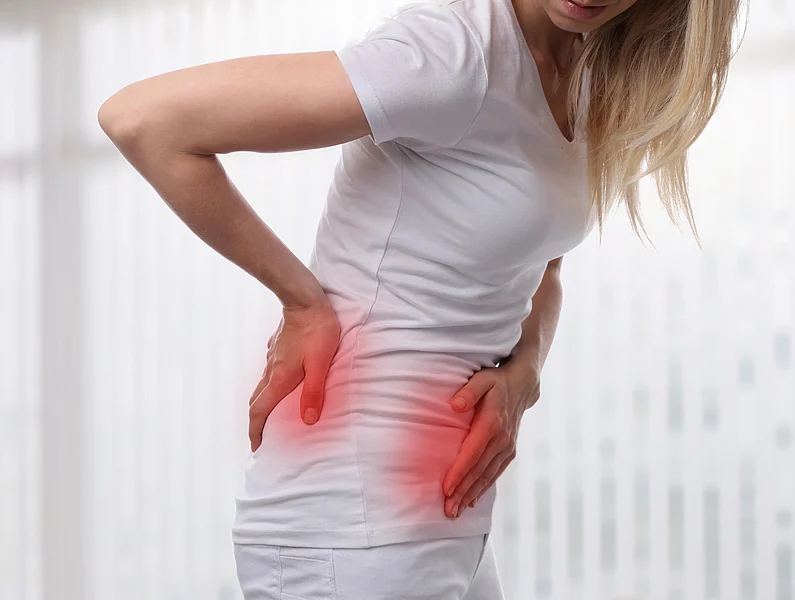Get Healthy!

- Cara Murez
- Posted June 18, 2023
Hot Weather Can Bring on Kidney Stones. Here's How to Cut Your Risk
Kidney stones are something most folks want to avoid at all costs, but few may know that the chances of developing this excruciating condition rise during the hot months of summer.
Luckily, it is possible to take steps to prevent stones from forming, primarily by increasing water intake and making small changes to your diet.
An expert from the Department of Urology at UT Southwestern Medical Center in Dallas offers some tips for avoiding kidney stones and the searing pain they can cause.
"Once you've had one stone, you have up to a 50% chance of having another within the next 10 years,"physician assistant Megan Bollner said in a UT Southwestern news release. "But many risk factors for recurring kidney stones are within your control, and changing your eating habits can make a big difference."
Kidney stones are more likely to develop in urine that is highly concentrated, appearing dark yellow instead of clear or light-colored. These stones are formed by crystals and can block the flow of urine as it leaves the kidneys through the tubes that carry urine to the bladder.
Calcium oxalate and other minerals can form stones, which often start out the size of a grain of sand but can grow to fill the inside of a kidney.
They become more difficult to pass as they grow, sending more than a half million people to U.S. emergency rooms for treatment each year, according to the National Kidney Foundation.
About 1 in 10 people will develop a kidney stone during their lifetime, with men having a slightly higher risk.
Contributors to recurrence include family history, underlying kidney disease, obesity, diabetes, dietary choices, chronic dehydration and inflammatory bowel disease.
Symptoms include severe one-sided lower back pain, nausea, vomiting, fever, chills and bloody urine. Some, however, have no symptoms.
How do you steer clear of this? Bollner recommends:
- Drinking more fluids to stay hydrated to dilute your urine, at least 8 cups of water a day if you have had a previous kidney stone. Twelve cups is even better.
- Drinking extra water if it's hot outside and you're sweating.
- Adding lemon or lime juice to your water because citrates bind to calcium to help block stone formation.
- Limiting sodium intake. Eating a high-sodium diet increases the amount of calcium in urine. Federal guidelines recommend limiting sodium to 2,300 milligrams daily -- equal to about 1 teaspoon.
Reducing salt in your diet also benefits the kidneys in other ways, including helping to lower blood pressure. Chronic high blood pressure can narrow and weaken blood vessels, affect blood flow and may lead to kidney disease or failure.
Another tip is to eat calcium-rich foods. A normal amount of calcium is critical to the body's calcium regulation, even though it seems counterintuitive because calcium is implicated in kidney stone development. Calcium from food combines with oxalates in the intestines, forcing the oxalates into the feces instead of the urine. That reduces the risk of developing calcium oxalate stones.
Consume 1,000 to 1,200 milligrams of calcium a day from dairy, soy, beans, fortified tofu and green vegetables (kale and broccoli are good sources).
Eat plenty of fruits and veggies, which can help increase urinary citrate and prevent kidney stones.
Cut back on animal protein, which can increase your risk of developing stones. This includes not only red meat, but also chicken, pork, fish and even eggs. Limit meat intake to 8 ounces a day, Bollner recommends.
Even oxalates found in healthy foods can contribute to kidney stone formation, so monitor how much you're eating of these foods: spinach, beets, nuts, wheat germ, rhubarb and soy. It is unlikely for oxalate consumption alone to cause stones, but excessive amounts can greatly increase the risk.
Keep your diet varied or eat a serving of dairy when you are consuming foods high in oxalate.
More information
The National Kidney Foundation has more on kidney stones.
SOURCE: UT Southwestern Medical Center, news release, June 12, 2023







